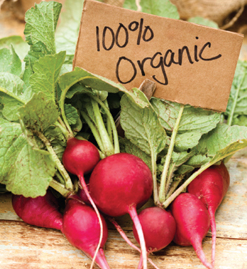Study Proves Organic Food Is Better for You
The largest study of its kind has found significant benefits to organic food. An international team led by?Newcastle University?has shown that organic crops are up to 69% higher in a number of key antioxidants than conventionally-grown crops. Antioxidants are know to reduce the risk of chronic diseases, including  cardiovascular and neurodegenerative diseases and certain cancers. The study found that by switching to organic fruit, vegetables and cereals ? and food made from them ? would provide additional antioxidants equivalent to eating between one to two extra portions of fruit and vegetables a day. The study also showed that pesticide residues were four times more likely to be found in conventional crops than organic ones. The study is the most extensive analysis of the nutrient content in organic versus conventionally-produced foods ever undertaken.
cardiovascular and neurodegenerative diseases and certain cancers. The study found that by switching to organic fruit, vegetables and cereals ? and food made from them ? would provide additional antioxidants equivalent to eating between one to two extra portions of fruit and vegetables a day. The study also showed that pesticide residues were four times more likely to be found in conventional crops than organic ones. The study is the most extensive analysis of the nutrient content in organic versus conventionally-produced foods ever undertaken.
UN recognition for Slow Food Founder, Carlo Petrini
On July 7, during the?UN Leadership Forum?that took place in Turin, Slow Food founder Carlo Petrini received recognition for  his work around the world.?Petrini was presented with an award that intends to “celebrate personalities who, through their personal commitment, have demonstrated?extraordinary leadership skills in developing local initiatives with a strong global impact. It recognizes those who contribute to the common objective of the United Nations without leaving anyone behind.”?Carlo Petrini has led the international movement for the past 25 years.?The forum was opened by the Deputy Secretary of the UN, Jan Eliasson. It was also attended by Piero Fassino, Mayor of Turin, who expressed his pride about the event and the collaboration with the United Nations.
his work around the world.?Petrini was presented with an award that intends to “celebrate personalities who, through their personal commitment, have demonstrated?extraordinary leadership skills in developing local initiatives with a strong global impact. It recognizes those who contribute to the common objective of the United Nations without leaving anyone behind.”?Carlo Petrini has led the international movement for the past 25 years.?The forum was opened by the Deputy Secretary of the UN, Jan Eliasson. It was also attended by Piero Fassino, Mayor of Turin, who expressed his pride about the event and the collaboration with the United Nations.
Bird Population Declines Linked to Neonicotinoid Pesticides
In addition to previous research on the direct impacts of pesticides on pollinators, a recent study published by Dutch scientists establishes an additional link between neonicotinoid use and insect-eating birds. The report provides evidence that neonicotinoids, a class of systemic pesticides, are indirectly  hurting larger creatures by reducing insect prey populations such as mosquitoes and beetles. Researchers found that in certain areas of the Netherlands where water is contaminated with high concentrations of imidacloprid, a commonly used neonicotinoid, bird populations tend to decline by an average of 3.5 percent every year. Further analysis found that this spatial pattern of decline appeared only after the introduction of imidacloprid to the Netherlands in the mid-1990s. Twenty-nine scientists representing multiple disciplines analyzed over 800 peer-reviewed publications on the impacts of systemic pesticides. The report emphasizes that neonicotinoids and their metabolites are persistent and harmful, even at very low levels, and that the chemicals have far-reaching impacts on entire ecosystems, from direct exposure to persistence in soil and water. Bees, butterflies, worms, and other pollinators and non-target organisms are also put at risk.
hurting larger creatures by reducing insect prey populations such as mosquitoes and beetles. Researchers found that in certain areas of the Netherlands where water is contaminated with high concentrations of imidacloprid, a commonly used neonicotinoid, bird populations tend to decline by an average of 3.5 percent every year. Further analysis found that this spatial pattern of decline appeared only after the introduction of imidacloprid to the Netherlands in the mid-1990s. Twenty-nine scientists representing multiple disciplines analyzed over 800 peer-reviewed publications on the impacts of systemic pesticides. The report emphasizes that neonicotinoids and their metabolites are persistent and harmful, even at very low levels, and that the chemicals have far-reaching impacts on entire ecosystems, from direct exposure to persistence in soil and water. Bees, butterflies, worms, and other pollinators and non-target organisms are also put at risk.

Comments are closed.